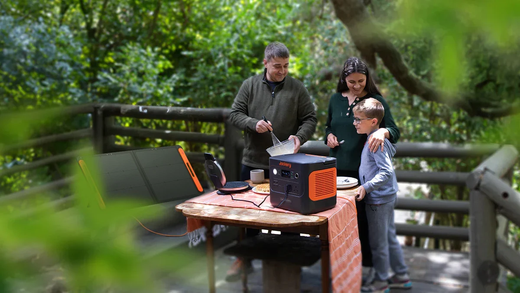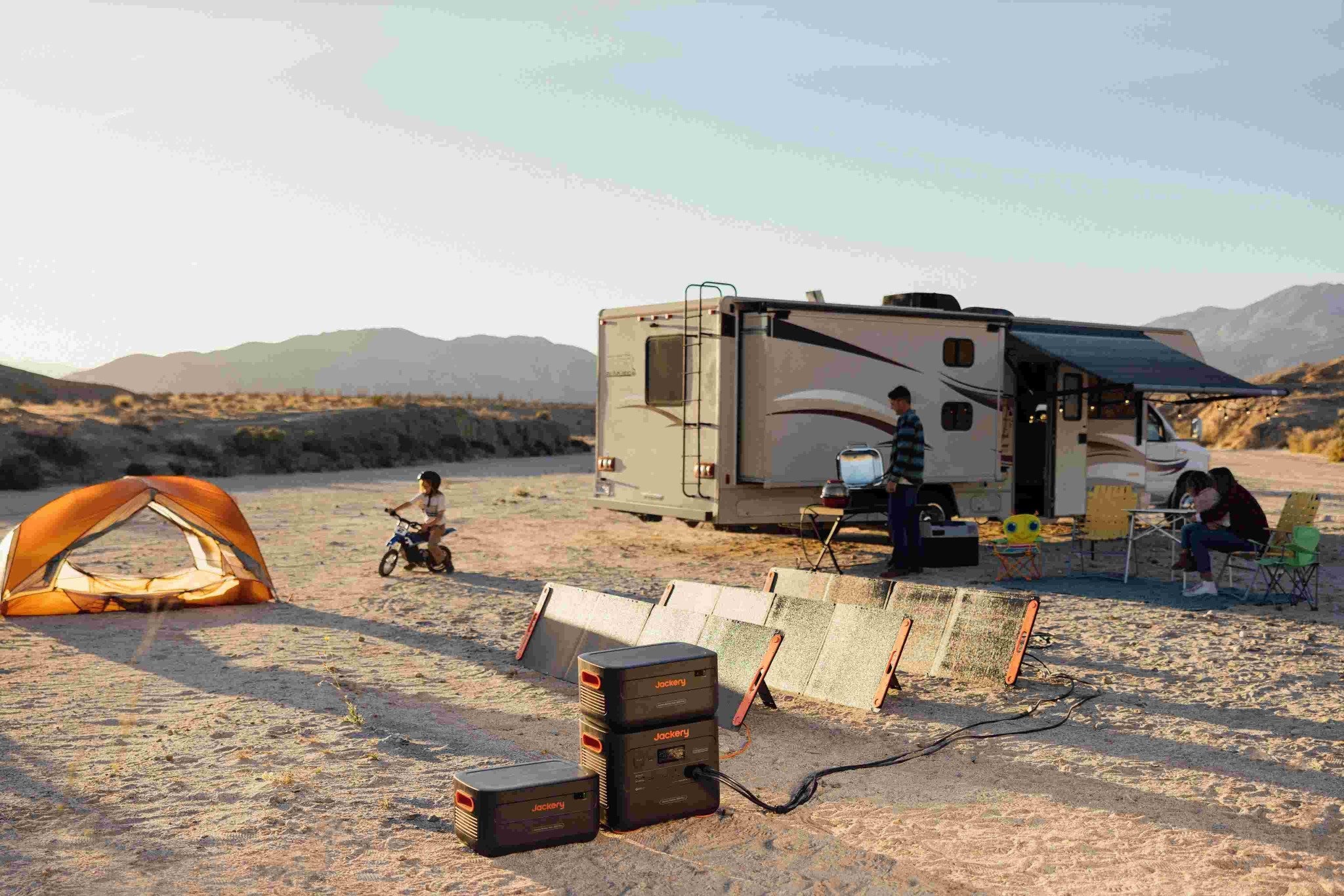In recent years, the reliance on home electric generators in the UK has surged due to frequent power outages and unpredictable climate-related emergencies. As storms intensify, homeowners are increasingly recognizing the importance of having a backup power source. This necessity is crucial for maintaining comfort and safety during emergencies, making the use of a backup generator for home not just a luxury but a requirement.
The rise in extreme weather and natural disasters has highlighted our dependence on reliable electricity. A home electric generator serves as a vital safeguard, ensuring life continues uninterrupted in challenging times. Moreover, advancements in generator technology have made these devices more efficient, quieter, and eco-friendly, enabling homeowners to choose solutions that align with their values.
At Jackery, we are committed to providing innovative energy solutions that meet diverse needs. This article aims to serve as a comprehensive FAQ about home electric generators, covering essential topics such as their definition and functionality, more info on emergency generator for home use, key installation details, and guidance on selecting the best generator for house. We will also showcase our range of Jackery products designed for sustainable power solutions, aligning with the growing trend towards eco-conscious living.
What is a Home Electric Generator?
Definition and Functionality
A home electric generator is a device that converts mechanical energy into electrical energy, providing power during times when the main grid fails. There are two primary types of generators: portable and standby. Portable generators are versatile and can be moved to different locations, making them ideal for outdoor activities or temporary power needs. Standby generators, on the other hand, are permanently installed and automatically kick in when the power goes out, ensuring an uninterrupted power supply to essential systems.
Understanding how home electric generators work is vital for homeowners. These devices typically operate using internal combustion engines that convert fuel into mechanical power. The mechanical power is then converted into electrical power through an alternator. Most generators can be fueled by gasoline, diesel, or propane, each having its own advantages and limitations.
Common Uses
Home electric generators are particularly beneficial during power outages, which can disrupt daily life, from food preservation to heating and cooling systems. They are also invaluable for outdoor activities such as camping or tailgating, providing a reliable source of power for appliances and devices. In the realm of remote work, a generator can ensure that productivity is not hampered by unexpected blackouts.
For families relying on medical equipment or those working from home, having a home electric generator is more than just a convenience; it’s often a critical need. Whether you are trying to keep food fresh in the refrigerator, maintain heating in winter, or power essential electronics for work or entertainment, a generator can make all the difference.
Types of Home Electric Generators
Portable Generators
Portable generators are typically powered by gasoline or propane and are characterized by their mobility and ease of use. They are an excellent choice for homeowners who require a flexible power source for short-term needs. The advantages of portable generators include lower upfront costs and the ability to use them in various scenarios, from powering tools on a construction site to providing backup during an outage.
The portability of these generators allows users to take them anywhere, making them a popular choice for recreational activities such as camping or outdoor parties. However, it's essential to ensure they are operated in well-ventilated areas to avoid carbon monoxide buildup. Furthermore, portable generators may not provide enough power for larger homes or multiple appliances, so it's crucial to assess your specific needs before making a purchase.
Standby Generators
Standby generators offer a more robust solution, automatically activating during power failures. They are connected directly to the home’s electrical system and can support larger loads, making them suitable for providing power to essential appliances like refrigerators, heating systems, and medical equipment. Installation of a standby generator usually requires a licensed electrician, as it involves connecting to the home’s electrical panel.
One of the significant advantages of standby generators is their automatic operation; they sense when power is lost and kick in without any manual intervention. This feature is particularly beneficial for homeowners who may not be present when an outage occurs, ensuring that critical systems remain operational even in their absence.
Solar Generators and Energy Banks
Solar generators are an eco-friendly alternative, harnessing energy from the sun to provide power. With the UK’s commitment to reducing carbon emissions, solar generators and solar energy banks are becoming increasingly popular. They are particularly suitable for homeowners looking to integrate renewable energy into their lives, and Jackery’s range of solar solutions exemplifies this shift towards sustainable power.
Solar generators operate using photovoltaic cells to convert sunlight into electricity. They store this energy in batteries, allowing users to draw power whenever needed. One of the advantages of solar generators is that they produce clean energy with minimal operating costs once installed. They are especially beneficial in locations where traditional fuel sources are hard to come by or for individuals seeking to reduce their environmental impact.

How to Choose the Right Generator for Your Home
Power Requirements
Before purchasing a home electric generator, it is crucial to assess your household's power needs. Calculate the total wattage of the devices you want to run simultaneously, factoring in the starting wattage required for appliances with motors. This evaluation will help you select a generator that can adequately support your power requirements.
Most manufacturers provide a wattage chart, detailing how much power various devices consume. For example, a refrigerator might use around 600 watts, while a furnace could require upwards of 1,500 watts. Adding up these requirements ensures that you select a generator capable of handling your needs without overloading.
Fuel Types
When it comes to fuel options, homeowners have several choices: gasoline, diesel, propane, and solar. Gasoline generators are widely available and provide good performance, but they require regular maintenance and fuel supply. Diesel generators are more efficient but can be louder and more expensive. Propane generators offer cleaner burning and longer shelf life but may require additional storage. Solar generators provide a sustainable solution with low operating costs, aligning perfectly with eco-conscious homeowners.
Each fuel type has its advantages and disadvantages. For instance, gasoline is readily accessible but has a limited shelf life. Diesel may offer better fuel efficiency but can be costly upfront. Propane has a longer shelf life and burns cleaner, but it requires a propane tank, which may not be convenient for all homeowners. Solar generators, while more environmentally friendly, depend on weather conditions for optimal performance, necessitating a comprehensive understanding of your local climate.
Key Features to Look For
When choosing a generator, consider essential features such as wattage capacity, noise levels, and safety attributes. Look for models with automatic shut-off capabilities, overload protection, and easy-to-read power meters. These features enhance the safety and usability of your generator, ensuring it meets your home’s needs effectively.
Additional features to consider include portability options, such as wheels or handles, especially for portable generators. For standby generators, features like remote monitoring and mobile app integration can offer peace of mind by allowing homeowners to check their generator’s status from anywhere.
Generator Installation
Professional vs. DIY Installation
Installing a generator can be a complex task, leading many homeowners to wonder whether to hire a professional or attempt a DIY installation. Hiring a professional ensures compliance with safety regulations and can save time, but it comes at a higher cost. DIY installations can save money, but they require a solid understanding of electrical systems and local regulations.
It’s crucial to weigh the risks and benefits of both options. A professional installation may provide warranties and guarantees that can offer peace of mind, while DIY installations can foster a sense of accomplishment. For those who opt for DIY, it's vital to follow the manufacturer’s guidelines meticulously and consult local codes to avoid potential legal issues.
Installation Requirements
In the UK, certain permits and regulations govern the installation of generators. It's essential to check local codes and guidelines to ensure your installation meets safety standards. This may involve notifying your local council or adhering to specific electrical standards to guarantee safe operation.
Permits may be required for both portable and standby generators, particularly for installations involving permanent connections to the electrical grid. Consulting with local authorities can clarify what is necessary and help you navigate any potential hurdles.
Safety Tips
Safety is paramount during generator installation. Ensure that the generator is placed in a well-ventilated area to prevent carbon monoxide buildup, keep it dry and away from flammable materials, and use a transfer switch to prevent backfeeding into the grid. Familiarize yourself with the generator’s operation manual, and conduct regular safety checks to maintain optimal performance.
Additional safety measures include keeping children and pets away from the generator and regularly testing the equipment to ensure it operates correctly. Adhering to safety guidelines not only protects your property but also ensures the well-being of everyone in the household.
Maintenance Tips for Your Home Generator
Regular Maintenance Checklist
To keep your home electric generator in prime condition, regular maintenance is essential. A comprehensive maintenance checklist includes:
- Oil changes: Change the oil according to the manufacturer's recommendations to ensure optimal performance.
- Fuel checks: Monitor fuel levels and replace old fuel to prevent engine issues.
- Battery care: Inspect and maintain the battery, ensuring it is charged and clean.
- Air filter replacement: Clean or replace the air filter regularly to prevent dirt from entering the engine.
- Spark plug inspection: Check spark plugs for wear and replace them as necessary to maintain ignition efficiency.
- Cooling system maintenance: Regularly check the coolant levels and inspect hoses for leaks or wear.
These maintenance tasks can significantly extend the lifespan of your generator and enhance its efficiency. Keeping a log of maintenance activities can also help track when specific tasks are due, making it easier to stay on top of your generator's care.
Troubleshooting Common Issues
Home generators may encounter various issues over time, including difficulty starting, low power output, and unusual noises. Being able to troubleshoot these common problems can save homeowners time and frustration. Regularly reviewing the owner’s manual for troubleshooting tips can help identify and resolve issues quickly.
For instance, if your generator fails to start, it may be due to a dead battery or stale fuel. Similarly, if the generator runs but does not produce power, checking the circuit breakers and fuses is a good first step. Keeping a toolkit on hand with basic repair tools can facilitate quick fixes, ensuring that your generator remains operational when needed.
Why Choose Jackery?
As a leader in portable power solutions, Jackery is renowned for its innovative and high-quality products that cater to a variety of power needs. Our commitment to sustainability is evident in our focus on eco-friendly energy solutions, making us a trusted choice for homeowners seeking reliable power sources. Jackery was founded with the mission to provide accessible and sustainable power solutions. With a focus on innovation and user-centric design, we have developed a range of products that are not only functional but also aesthetically pleasing and easy to use. This combination of style and performance has solidified Jackery’s reputation as a leader in the portable power market.
Why Jackery Stands Out
Jackery's reputation for reliability and performance is bolstered by our user-friendly designs and robust customer support. Our dedication to research and development ensures that our products incorporate the latest advancements in portable power technology, providing peace of mind to consumers. Our focus on portability and efficiency aligns with modern needs, making it easy for users to incorporate Jackery products into their daily lives. Moreover, Jackery's commitment to sustainability resonates with environmentally conscious consumers, as our solar products help reduce reliance on fossil fuels.
Product Highlight: Jackery Explorer 1000 Plus Portable Power Station
The Jackery Explorer 1000 Plus Portable Power Station is a powerful, versatile option designed for both home backup and outdoor adventures. With a capacity of 1002Wh, it offers multiple output options and can charge up to 8 devices simultaneously. Its compatibility with Jackery SolarSaga solar panels provides a sustainable power solution, making it an excellent choice for eco-conscious homeowners. This portable power station features a compact design, making it easy to transport for camping trips or outdoor events. The unit's built-in safety features, including short circuit and overload protection, ensure that devices remain secure during use.
Product Highlight: Jackery Solar Generator 300 Plus
The Jackery Solar Generator 300 Plus serves as an ideal entry-level solar generator. With a capacity of 293Wh, it is easy to use and offers multiple recharging options. Its eco-friendly design aligns perfectly with Jackery’s mission to promote clean energy, making it a great option for homeowners looking to reduce their carbon footprint. The Jackery Solar Generator 300 Plus is designed with convenience in mind, featuring a lightweight structure and user-friendly interface. It can be charged using solar panels, AC outlets, or car ports, providing versatility for various applications. This generator is particularly well-suited for short trips or as a backup power source for essential devices during outages.
Product Highlight: Jackery Solar Generator 2000 Plus
For those needing substantial power storage, the Jackery Solar Generator 2000 Plus offers a robust solution with a capacity of 2060Wh. This generator is capable of supporting larger appliances for extended durations, and its efficiency is enhanced by compatibility with Jackery SolarSaga solar panels, providing a reliable eco-friendly power source in emergencies. The Jackery Solar Generator 2000 Plus boasts rapid recharging capabilities, allowing users to harness solar energy quickly. Its ability to power multiple high-demand devices simultaneously makes it an ideal choice for larger households or those who rely on several appliances during outages.
FAQs About Home Electric Generators
What is the difference between a portable generator and a standby generator?
Portable generators are movable and ideal for temporary power needs, while standby generators are permanently installed and provide automatic backup power during outages.
How do I determine the right size generator for my home?
Assess your power requirements by calculating the wattage of the devices you need to run simultaneously.
Can I use a generator indoors?
No, generators should always be used outdoors in well-ventilated areas to avoid carbon monoxide poisoning.
Do I need a permit to install a generator?
Yes, installation permits may be required depending on local regulations. Always check your local codes.
How often should I service my generator?
Regular maintenance is crucial; aim for at least once a year, or more frequently if the generator is used often.
What is the average lifespan of a home generator?
The lifespan of a home generator can vary based on usage, maintenance, and type, but many generators last between 10 to 30 years with proper care.
Are solar generators effective in cloudy weather?
Yes, solar generators can still produce power on cloudy days, though their efficiency may be reduced. It's essential to have sufficient solar panels to capture enough energy during less sunny conditions.
What safety precautions should I take when operating a generator?
Always operate generators outdoors, keep them away from flammable materials, use a transfer switch for standby units, and follow the manufacturer’s safety guidelines to prevent accidents.
Conclusion
At Jackery, we understand that home electric generators are essential for UK homeowners, providing reliable power during outages and ensuring comfort and safety in challenging times. With the rise in extreme weather patterns, having a dependable power source is more critical than ever. By familiarizing yourself with the types of generators available, their installation requirements, and maintenance practices, you can make informed decisions about your power needs. Investing in a generator is not just about convenience; it’s about safeguarding your home and family during emergencies.
We encourage you to assess your power requirements carefully and consider investing in a suitable generator from Jackery. Whether you need portable generators for casual outings or robust standby units for comprehensive home support, we have a solution that meets your needs.
For those exploring home power solutions, we recommend consulting professionals for installation advice and considering our commitment to quality and sustainability. By investing in a home electric generator, you can ensure your home remains a safe and comfortable haven, regardless of external conditions. Taking action now can make all the difference when the unexpected happens. Don't wait for the next storm to hit—embrace the future of power solutions with Jackery and prepare your home for whatever comes your way.


































































































